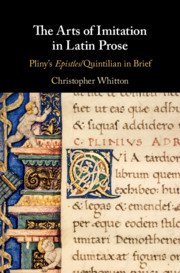Book contents
- The Arts of Imitation in Latin Prose
- The Arts of Imitation in Latin Prose
- Copyright page
- Dedication
- Epigraph
- Frontispiece
- Contents
- Ad lectorem
- Quintilian in Brief, in Brief
- Abbreviations
- Chapter 1 Two Scenes from the Life of an Artist
- Chapter 2 Setting the Stage
- Chapter 3 Brief Encounters
- Chapter 4 Dancing with Dialectic
- Chapter 5 Through the Looking-Glass
- Chapter 6 On Length, in Brief (Ep. 1.20)
- Chapter 7 Letters to Lupercus
- Chapter 8 Studiorum secessus (Ep. 7.9)
- Chapter 9 Docendo discitur
- Chapter 10 Reflections of an Author
- Chapter 11 Quintilian, Pliny, Tacitus
- Chapter 12 Beginnings
- References
- Index locorum
- Index of Greek and Latin Words
- General Index
Chapter 9 - Docendo discitur
Published online by Cambridge University Press: 10 June 2019
- The Arts of Imitation in Latin Prose
- The Arts of Imitation in Latin Prose
- Copyright page
- Dedication
- Epigraph
- Frontispiece
- Contents
- Ad lectorem
- Quintilian in Brief, in Brief
- Abbreviations
- Chapter 1 Two Scenes from the Life of an Artist
- Chapter 2 Setting the Stage
- Chapter 3 Brief Encounters
- Chapter 4 Dancing with Dialectic
- Chapter 5 Through the Looking-Glass
- Chapter 6 On Length, in Brief (Ep. 1.20)
- Chapter 7 Letters to Lupercus
- Chapter 8 Studiorum secessus (Ep. 7.9)
- Chapter 9 Docendo discitur
- Chapter 10 Reflections of an Author
- Chapter 11 Quintilian, Pliny, Tacitus
- Chapter 12 Beginnings
- References
- Index locorum
- Index of Greek and Latin Words
- General Index
Summary
This chapter reads the cycle of letters to Quadratus and Fuscus of which Epistles 7.9 (Chapter 8) forms the keystone. Epistles 6.11 introduces these two young men as the bright future of Roman oratory, with a fanfare constructed from Quintilian (Institutio 10) and Tacitus’ Aper (Dialogus). Epistles 6.29 is the partner to Epistles 7.9, matching but varying its imitation of Quintilian and Cicero, as Pliny continues playing praeceptor in surprising and arch ways. Epistles 9.36 and 9.40, describing his villa routine to Fuscus, constitute the twin sphragis of the collection. These deceptively simple letters take us to the core of Pliny’s self-styling as man and author, perofmed with pregnant imitations which confirm Quintilian’s very special, and very personal, role in the Epistles.
Keywords
- Type
- Chapter
- Information
- The Arts of Imitation in Latin ProsePliny's <I>Epistles</I>/Quintilian in Brief, pp. 323 - 352Publisher: Cambridge University PressPrint publication year: 2019



